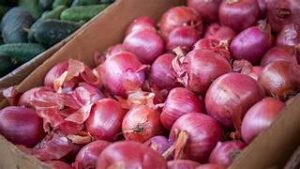
In a decisive move to stabilize the local onion market, the Philippines’ Department of Agriculture, under the stewardship of Secretary Francisco Tiu Laurel Jr., has declared a temporary cessation of onion importation extending until May. This strategic decision comes in the wake of a significant drop in farm gate prices due to an oversupply in the market.
This directive from the Department of Agriculture seeks to shield local onion prices from further decline, following a notable dip to between P50 and P70 per kilo. This situation is poised to intensify, especially with the anticipated influx of newly harvested onions in February. Certain regions like Nueva Ecija, a major onion-producing area in Luzon, have already witnessed farm gate prices plummeting to as low as P20 per kilo.
This intervention followed a crucial meeting between Secretary Laurel and representatives from the Philippine Chamber of Agriculture and Food Inc. (PCAFI), where they deliberated on the burgeoning domestic supply, exacerbated by the late arrival of onion imports from December. In fact, approximately 99 tons of imported onions arrived only between January 1 and 15, further saturating the market.
Considering these dynamics, Secretary Laurel did not dismiss the possibility of prolonging the import suspension until July, albeit with a caveat. He emphasized that this extension is contingent upon market conditions, particularly if an unexpected shortage arises, prompting an earlier resumption of imports. The unpredictable influence of El Niño, with its warmer temperatures and potential for prolonged dry spells, adds another layer of complexity. The Department of Agriculture remains vigilant, acknowledging that El Niño might foster pest proliferation, thereby impacting onion production, with the full brunt of this climatic phenomenon expected around March and April.
Despite these challenges, the Philippine Chamber of Agriculture and Food Inc. reported an anticipated surplus in supply, attributing it to a 40% increase in land area dedicated to onion cultivation. Even with concerns about armyworm infestations in regions like Tarlac and Nueva Ecija, the forecast remains a supply glut, as the pest is projected to affect merely 5% of the standing crops.
In light of these developments, regular consultations are scheduled between the Department of Agriculture and PCAFI, with a 45-day interval for reviewing the supply situation and adjusting import schedules and volumes as necessary. The next rendezvous is slated for early March, ensuring a dynamic and responsive approach to the evolving market conditions.






















Comments are closed for this article!